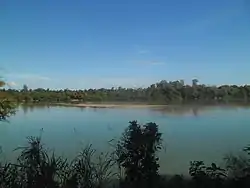Tonlé San
Tonlé San, also known as Tonlé Se San or Sesan River (Khmer: ទន្លេសេសាន, Tônlé Sésan, Vietnamese: Sông Sê San), is a river that flows through central Vietnam and north-east Cambodia. It is a major tributary of the Mekong River. Its tributaries include the Dak Bla, Dakpsy, Sa Thầy and Lagrai rivers.[1] A short portion of the river forms a part of the international border between Cambodia and Vietnam.

| Tonlé San Ya Krong Po Ko | |
|---|---|
 Tonlé San | |
| Native name | Sông Sê San (Vietnamese) |
| Location | |
| Country | Vietnam, Cambodia |
| Physical characteristics | |
| Source | |
| • location | confluence of Dak Psi and Dak Po Ko |
| • coordinates | 14.6063°N 107.8404°E |
| Mouth | |
• location | Mekong |
• coordinates | 13.536°N 105.965°E |
| Basin size | 17,000 km2 (6,600 sq mi) |
| Basin features | |
| Progression | Tonlé San—Mekong—Mekong Delta—South China Sea |
There are a number of hydropower dams on the Se San River and its tributaries. Where it joins the Srepok River in the Lower Se San 2 Dam. Upstream is the dam cascade: Se San 4A, Se San 4, Se San 3A, Se San 3, Yali Falls. On the Dak Po Ko River is the Plei Krông dam. There are also several dams on tributaries of the Dak Bla, including the Dak Snghé, tributary of the Dak Bla, is the Upper Kontum dam and hydropower plant, which discharges into the Tra Khuc River, and the Dak Doa.[2]
External links
References
- Truong, Hong (2013). Tran Thi Minh Hue, Pham Cong Tri, Vo Nhu Phuc , Nguyen Quang Ngoc, Đao Thi Linh Uyen. "Basin Profile of the Upper Sesan River" (PDF). ICEM – International Centre for Environmental Management. Project report: Challenge Program on Water & Food Mekong project MK3 “Optimizing the management of a cascade of reservoirs at the catchment level”. Hanoi, Vientnam. Retrieved 2 October 2023 – via Mekong River Commission.
- United Nations Framework Convention on Climate Change. "CDM: Dak Doa Hydropower Project". cdm.unfccc.int.